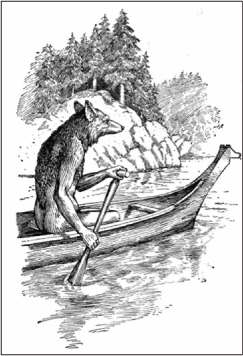Native North American MythologiesNative American Tricksters |
Who is Coyote? |
Coyotes exist in most parts of America, and, appropriately, so do Coyote trickster myths. Wherever he is, Coyote is both clever and foolish, creative and destructive, otherworldly and worldly, a supporter of community but also a loner. He will do anything for sex and for food, and he recognizes few social boundaries or taboos. Like cartoon figures such as Road Runner or Bugs Bunny, he is a braggart, and sometimes he becomes the butt of his own tricks. Like most tricksters, Coyote can also be a culture hero. A Papago myth tells how Coyote saved himself and Montezuma and Montezuma’s people from the flood by warning the chief to build a huge canoe.
Two myths will serve to illustrate aspects of this figure’s personality. The first is a creation myth of the Maidu of California. At the beginning of time, say the Maidu, when there was only darkness and the primordial waters, two beings suddenly emerged from the nothingness in a raft. These were Turtle and Earth-Initiate, who immediately began to create the world. Then one day, also out of nowhere, Coyote arrived with Rattlesnake, his pet. Coyote enjoyed watching Turtle and Earth-Initiate create the animals and First Man and First Woman out of clay. Then he thought, “If they can make things, so can I.”
But as hard as he worked, his creations failed and he laughed at them. When Earth-Initiate scolded him for laughing at the new creations, Coyote said he had not been laughing. This was the first lie told in the world. Meanwhile, Earth-Initiate continued, making a perfect world, even teaching the people how to remain forever young. But now Coyote became like the Serpent of Genesis—another trickster. When he visited the people of Earth-Initiate’s world, the people told him how happy they were in their perfect world. This irritated Coyote, and he told the people he could show them how it would be better if sickness and death could become a part of life. Knowing nothing of sickness and death, the people wanted to know more. So Coyote, now a negative culture hero, taught them about competition by suggesting that they have a footrace. Meanwhile, Coyote had his pet, Rattlesnake, wait in a hole along the path of the race. But Coyote was to regret his own trick when it became evident that his own son would lead in the race and would be the victim of the waiting snake. When the boy fell dead, the people thought he did not get up because he was embarrassed by falling and thus losing the race. But Coyote knew better and wept the first tears in world. From then on people did not remain young. When they grew old, they died.
The second myth is a Rosebud Sioux tale told by Jenny Leading Cloud. One day Coyote and Iktome the Spider were walking along when they came to a rock named Iya. Coyote respected the rock, as he knew it had great powers. So he gave the rock his beautiful blanket as a gift. But later, when a storm came up, Coyote missed his blanket and wanted it back. Iktome warned him against it, but Coyote went back to Iya and demanded his blanket back. But the rock stopped him saying, “What is given is given.” Coyote became enraged, tore the blanket off the rock and placed it on his own back. “There, that’s that,” cried Coyote. “Oh no, it isn’t,” the rock murmured. Now Coyote and Iktome went into a cave to wait out the storm. When the sun came out again, they sat down on the path to have a smoke and some fry bread. A strange rumbling noise caught their attention, however, and looking up they saw Iya the rock rolling toward them. “Run,” Iktome shouted, and they did, but the rock was gaining on them. “Swim across the river,” cried Iktome, and they did, but Iya rolled right along after them. When they tried to hide among trees, the rock simply knocked down the trees. Now Iktome had had enough: “Your problem!” he called as he descended into a spider hole, narrowly avoiding what happened to Coyote, who now lay flattened on the ground by the huge rock. Iya picked up the blanket and went away. Sometime later a man came along and thought Coyote was a rug. He took the rug home and placed it before his fireplace. But next morning the man’s wife came to him and said,” I just saw that rug of yours running away across the field.”

Coyote is an anthropomorphized trickster figure who often appears in myths of many of the Native American people. Both clever and foolish, creative and destructive, otherworldly and worldly, he is a supporter of community but also a loner.
